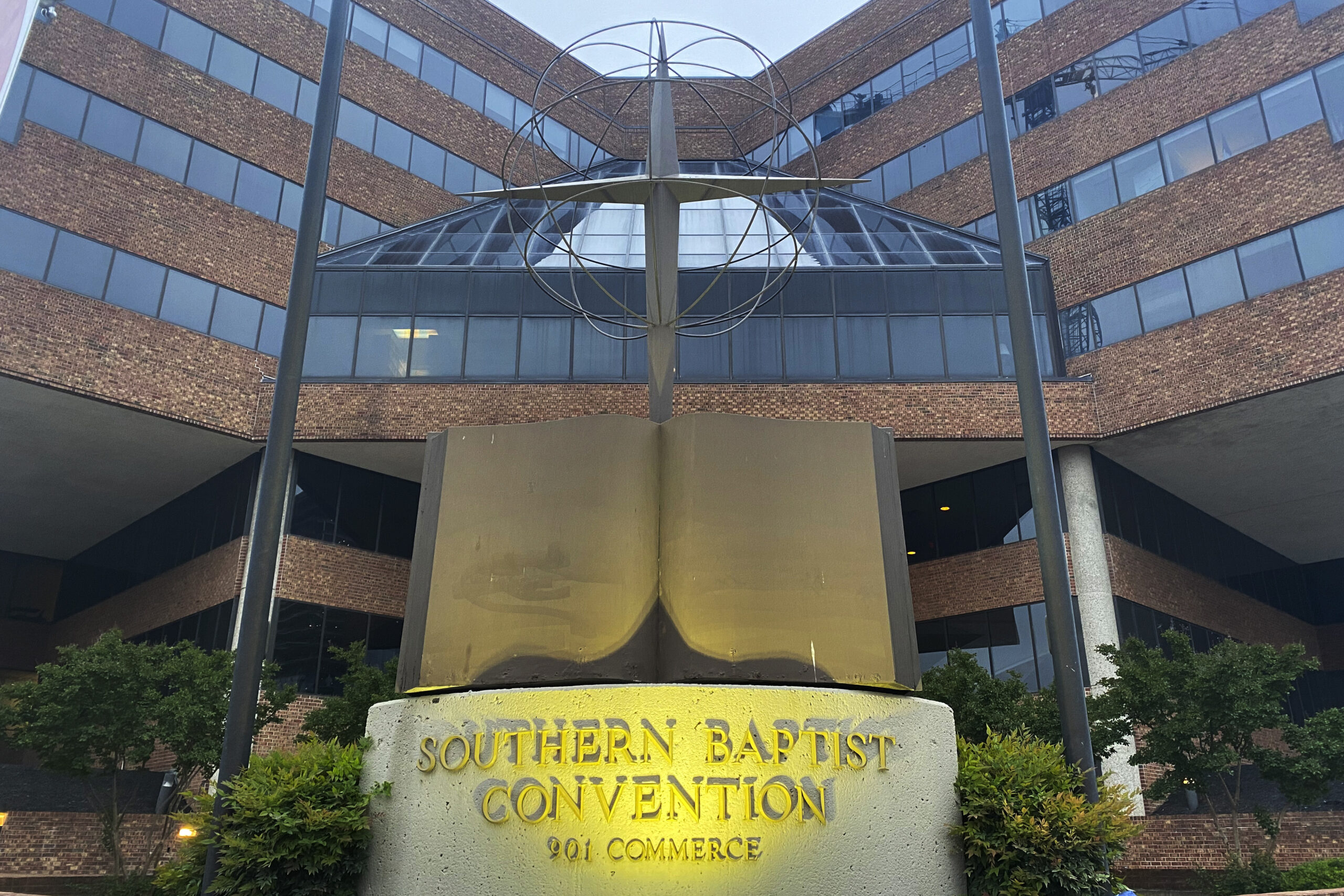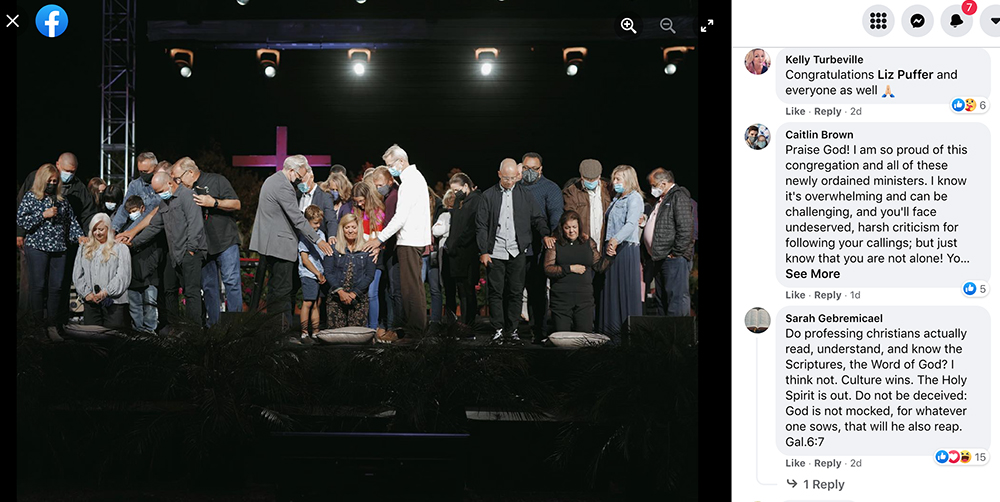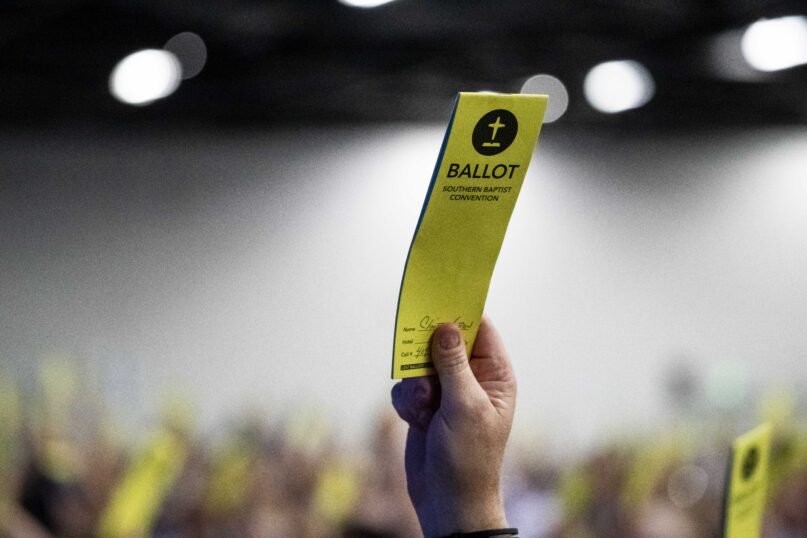(RNS) — Students of British history are familiar with the Great Ejection of 1662, when on St. Bartholomew’s Day that year several thousand “dissenting” ministers — Nonconformist Puritans who would not accept the Church of England’s Book of Common Prayer — were forced out of the established church and Parliament followed with a series of laws .
As ecclesial ousters go, the Great Ejection is outdone by the Defenestration of Prague in 1618, when angry Bohemian Protestants, protesting a halt to construction of several new church buildings, threw two Catholic royal regents and their secretary out of the third-story window of Prague Castle. The victims somehow survived the fall, but the spectacle set off the bloody Thirty Years’ War between Protestants and Catholics.
Our present-day battles in the Southern Baptist Convention have not provoked defenestrations or forced ejections — yet. However, the largest Protestant denomination in the U.S. could be headed toward a great ejection at its annual meeting in June.
There is precedent for great departure, if not expulsions in the SBC. From the late 1970s into the 1980s, the so-called battle for the Bible, won by conservatives championing the inerrancy of the Scriptures, resulted in a great departure by moderates, but no great ejection. To be sure, missionaries were recalled and professors were forced out, but very few congregations were actually ejected and for the most part moderates left voluntarily, often saying: “We didn’t leave them. They left us.”
Participation in the SBC changed again in 1992 when a proposed amendment to the SBC’s constitution stated that congregations which “affirm, approve, or endorse homosexual behavior” are “not in cooperation with the Convention.” The SBC took the unprecedented step of ejecting two North Carolina congregations, Pullen Memorial Baptist Church in Raleigh and Binkley Memorial Baptist Church in Chapel Hill.
In 2000 Southern Baptists had revised their doctrinal statement, the Baptist Faith and Message, to declare that “the office of pastor is limited to men as qualified by Scripture,” and in 2014 amended its constitution to clarify that inclusion in the convention depended on adherence to the Baptist Faith and Message. The change provided a basis to eject churches with women pastors.

A cross and Bible sculpture stands outside the Southern Baptist Convention headquarters in Nashville, Tennessee, May 24, 2022. (AP Photo/Holly Meyer, File)
Ridding the SBC of women preachers has been a goal since Addie Davis was ordained by the Watts Street Baptist Church of Durham, North Carolina, on Aug. 9, 1964. Jack Gritz, editor of The Baptist Messenger of Oklahoma, probably spoke for the vast majority of Southern Baptists at the time when he opined that the teaching of the New Testament “is plain that only men are to be considered for the gospel ministry.”
Previously, no Baptist church in the South would risk calling a woman pastor. Even the progressive Baptists at Watts Street Baptist did not initially agree to ordain Davis. As deacon board chair Vivian Parks wrote to her in a letter, “It is the feeling of the deacons and the pastor that ordination should await a definite call to a church.”
But, as the Scripture says, with God all things are possible. When the First Baptist Church of Readsboro, Vermont, a congregation affiliated with the American Baptists, invited Davis to be its pastor, the deacons and pastor of Watts Street Baptist Church agreed to ordain her.
Even then, Davis was more an annoyance than a threat. Few women immediately followed her example. Yet, 20 years later, enough had to provoke the SBC to issue a resolution, “On Ordination and the Role of Women in Ministry,” which justified opposing women’s ordination by blaming original sin on the first woman. It concluded, “We encourage the service of women in all aspects of church life and work other than pastoral functions and leadership roles entailing ordination.”
When the Baptist Faith and Message was changed in 2000, conservatives again thought they had effectively banned women pastors. After the vote, Albert Mohler Jr., president of the Southern Baptist Theological Seminary in Louisville, Kentucky, jubilantly announced: “It is clear that the vast, overwhelming majority of Southern Baptist churches said this document is precisely where we stand. This is where we want to declare ourselves.”
But the new language on ordination turned out to be more symbolic than substantial. Despite its declaration, congregations were free to call and ordain their own ministers, including women if they chose to do so, and some so chose. It wasn’t until the 2014 constitutional revision that the rule changes really took hold, and SBC hard-liners began looking for a test case.
They could have found easy targets among the few remaining moderate-leaning churches with women clergy — those dually aligned with other denominational bodies, such as the Cooperative or National Baptists. State conventions and local associations had already taken steps to expel congregations with women pastors.

People share a variety of reactions with a Saddleback Church post and photo on Facebook about ordaining three women in 2021. Screen grab
Instead, they fixed on the second largest congregation in the SBC, the multisite, megasized Saddleback Church in Lake Forest, California, led until recently by Rick Warren, one of the best-loved pastors in America. In 2021 Saddleback had ordained three women, each of whom had been serving as ministers in the congregation for decades. Then, following Warren’s retirement last June, Saddleback hired a new lead pastor and his wife was named a teaching pastor.
The SBC credentials committee considered a motion to break fellowship with Saddleback at the 2022 national meeting in Anaheim, California. Floor debate was vigorous, but the motion was deferred. It wasn’t until last month that the SBC Executive Committee voted to remove Saddleback and four other congregations, deciding they were not in “friendly cooperation.”
But that isn’t the end of the story. The Rev. Mike Law, pastor of the Arlington Baptist Church, in Virginia, has now presented the executive and credentials committees with a list of 170 women he claims are serving as “pastors” in SBC churches. He is asking that the congregations they serve be kicked out for violating the articles of faith.
Messengers at this year’s annual meeting in New Orleans on June 11-12 have two options: They can rescind the action of the Executive Committee and reinstate Saddleback and the four other congregations, or they can continue down the road of ejecting the disorderly churches with their 170 women pastors.
Option 1 involves a great confession. It would require saying, “We were wrong.” It means admitting that Saddleback and the other congregations are not in violation of the SBC articles of faith or perhaps even that the aggressive new path of ejecting “heretical” congregations is a mistake. That outcome seems unlikely.
Option 2 is a great ejection. Kick out all churches with their women preachers. A great ejection seems more likely than a great confession, but anything is possible.
The world will be watching to see how it turns out. Attendees will be invited to listen to preaching on the theme of the “Beatitudes of a Pastor.”
But to my mind the most pressing question is whether anyone will be thrown out of a window in the Ernest N. Morial Convention Center.
(Curtis W. Freeman, a research professor of theology and Baptist studies and director of the Baptist House of Studies at Duke Divinity School, is the author of “Pilgrim Letters” and “Pilgrim Journey.” The views expressed in this commentary do not necessarily reflect those of Religion News Service.)





